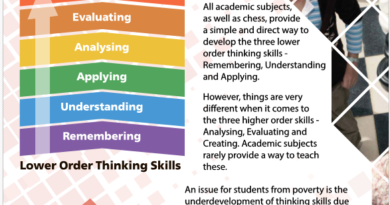Chess improves mental skills
by Dr. Uvencio Blanco Hernández

What aspects of chess attracted the attention of cognitivists?
Cognitive scientists considered that playing chess implied the manifestation of a series of interesting problems that, in addition, could have practical applications in the educational field. That is why the first research was directed towards the processes involved in solving chess problems. As a result, they considered that the search for solutions to multiple problems, presented on the board, suggested the performance of a complex cognitive activity. Hence its attraction.
On the other hand, chess presents a series of characteristics as an experimental technology, proving to be enormously productive in the field of computer science. In this respect, hundreds of academic articles have been written about chess and its applications in artificial intelligence; thousands of chess programs have been developed, most of which are still running, and hundreds of millions of computer chess games have been and are being played every day.
So computer chess represents a relatively simple system that can nevertheless be used to explore larger and more complex phenomena. So chess dominates artificial intelligence; thus it occupies a prominent place in the iconography of the discipline, as a quick browse through the book and journal listings of its literature will readily attest.
Intellectual and emotional domains as priority areas
Cognitive psychology, by using chess as a working tool in the exploration of the mind and the skills to be developed, has come up with two major areas of interest; complementary to each other: the intellectual, properly speaking, and the emotional. We have already seen in Blanco (2007) that:
“In the intellectual domain the impact of chess education is observed through the modification of the following skills: perception, attention, memory, analysis and synthesis, mathematical logical thinking, critical thinking, problem solving, decision making, emotional control and self-esteem, among others”.
As for the social aspect, it has also been observed that groups of schoolchildren who study chess regularly tend to: recognise and accept rules, accept and tolerate different ideas and points of view; collaborate with teamwork, accept defeat as an opportunity to learn, recognise silence as a shared right, etc.
On this topic, Armenian psychologists Ruben Aghuzumtsyan and Sona Poghosyan have conducted research with schoolchildren in Armenia, in which they explain how the systematic study of chess has a positive impact on the development of several of the most important thinking skills in children and young schoolchildren participating in organised chess courses.
The results of this experience are in line with an important body of research showing that, in addition to contributing to cognitive and creative development, chess has an additional impact on children’s concentration, will and memory. Naturally, these are essential traits for any school pupil.
The authors consider that, going forward, many questions remain to be asked – and answered – in the field of chess education. And they stress that, while current lines of research must maintain their momentum, there is also potential to incorporate medical and neurological approaches. Nevertheless, the introduction of chess into the school curriculum has generated a considerable amount of psychological, sociological and pedagogical research. Its innovative approaches and intriguing discoveries have aroused great interest among collaborators abroad.
Source
Aghuzumtsyan, R. & Poghosyan, S. (2019). “The Impact of Chess on Children’s Mental Development”. Chess in Armenian Schools. By Tatev Khachatryan. http://cis.chessacademy.am/static/article/33?lang=en
Blanco U. (2007). ¿Por qué el ajedrez en las escuelas? 3ra. Edic. CO-BO, Colegial Bolivariana, Caracas.
Blanco, U. (2020) “Ajedrez, ciencia cognitiva y educación”
Quin, R., & McMahom, B. (1997). Historias y estereotipos. Madrid.
Ediciones de la Torre.


